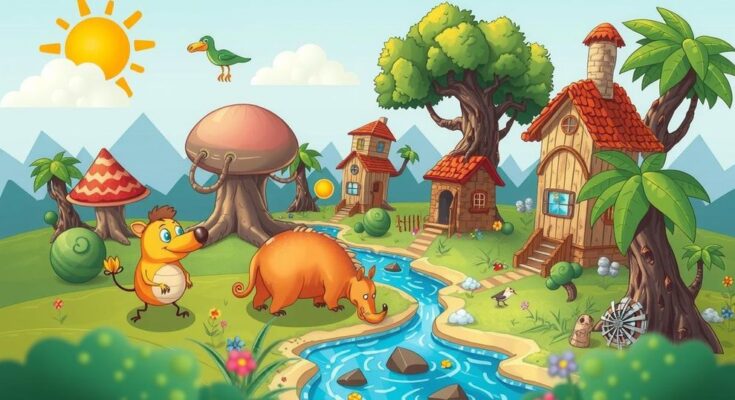This article explores the bizarre and absurd consequences of climate change, emphasizing the importance of humor in coping with environmental anxieties. From shrieking frogs and hybrid animals to beer shortages, these peculiar effects underscore the widespread impact of global warming. It encourages readers to use humor in climate advocacy to increase awareness and participation in addressing the crisis.
Addressing the consequences of climate change can be quite challenging. However, sometimes the best method to cope is through humor, which may alleviate the stress caused by environmental anxieties. The recognition of humorous aspects in dire situations can serve as a powerful tool for maintaining mental health amidst climate woes. Thus, in celebration of National Laugh Day, we present a compilation of the most peculiar consequences of global warming.
1. A Croaking Chorus: Global warming is leading to the shrinking of Puerto Rico’s coquí frogs, while simultaneously making their mating calls louder and higher. This phenomenon creates a unique yet unexpected soundscape in nature, akin to a tiny opera.
2. Baseballs Are Going, Going… GONE!: A 2023 study indicated that global warming reduces air density, causing baseballs to fly further. By the year 2100, home runs may increase by 10%, leading to an intriguing twist in Major League Baseball records.
3. A Condiment Crisis: Climate change-induced extreme weather patterns are disrupting the production of key crops, resulting in a shortage of chilies. This affects beloved condiments like Sriracha and Dijon mustard, drastically altering flavors in many dishes.
4. City Rats Are Thriving: Urban rat populations are surging, primarily due to rising temperatures that enhance their reproduction rates. Consequently, cities are grappling with increased rodent populations while residents face existential uncertainties.
5. Lions & Tigers & … Grolar Bears? Climatic changes and habitat loss are prompting unique animal hybrids, such as grolar bears and coywolves. These species adaptations reflect the altering ecosystems and challenges that wildlife is encountering due to climate change.
6. The Invasion of the Jellyfish: Jellyfish are expanding into unexpected regions, notably increasing sightings in UK and Irish waters by 32% in 2023 due to marine heatwaves. This shift is causing unforeseen encounters with these creatures.
7. Beware of Shark-Infested Waters: Warmer ocean temperatures are enticing sharks to venture into new areas, raising the possibility of shark encounters in unlikely locations. While the chances remain low, it enhances public apprehension about swimming in the ocean.
8. Withering Wine Grapes: Extreme heat and wildfires are altering the flavor of wine grapes, yielding sweeter, raisin-like products. This change is causing concern among wine enthusiasts regarding the future of their favorite vintages.
9. Satellites Are Speeding Up: With carbon emissions causing the thermosphere to contract, satellites experience less drag, moving faster and increasing collision risks. This change can potentially disrupt essential technologies such as GPS and communication systems.
10. Aquatic Anosmia: Ocean acidification is hindering fish’s sense of smell, impairing their navigation and survival capabilities. A significant rise in ocean carbon dioxide levels since the Industrial Revolution has contributed to this alarming trend.
11. Who Dimmed the Lights?: Rising sea temperatures result in decreased low-lying cloud cover, allowing more heat to be retained in the atmosphere. This phenomenon contributes to climate change and a dimmer appearance of the planet.
12. Bless You!: Longer spring seasons have extended pollen production by 21% from 1990 to 2018. Consequently, allergy sufferers are experiencing heightened challenges due to increasing pollen levels.
13. Mummy-Hungry Bacteria: Climate change is enabling humidity-loving bacteria to deteriorate ancient South American mummies, leading to their degradation. This makes even historical artifacts vulnerable to the impacts of climate change.
14. Trees Are Growing Faster: Some European forests are exhibiting accelerated growth due to heightened carbon dioxide levels and extended warm seasons. While this may benefit paper industries, it poses risks to ecological balance and biodiversity.
In summary, climate change bears bizarre and often humorous consequences that underscore the gravity of the situation. From altered ecosystems to remarkable adaptations in wildlife, it is evident that our planet is undergoing significant transformations. Utilizing humor as a response can foster greater awareness and engagement in climate advocacy efforts. This understanding paves the way for more constructive dialogues regarding climate action and its vital necessity.
Original Source: www.earthday.org




